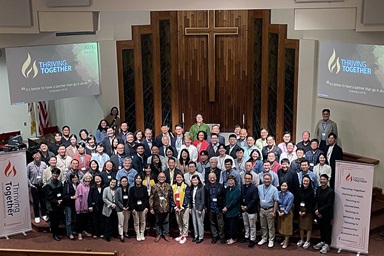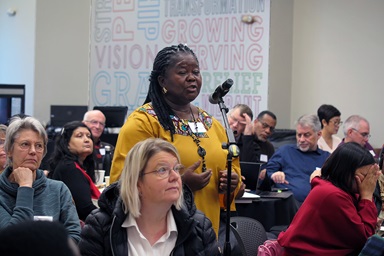Warnings about the deadly Ebola virus are being preached from the pulpits, broadcast on radio and shouted on the streets in an attempt to educate the public about a disease few here had ever heard of before a May outbreak.
Sierra Leone’s Bishop John K. Yambasu took the opportunity to warn the more than 1,000 people gathered for the dedication and opening of Valunia United Methodist Church in Monghere on June 8 about the need to seek immediate medical attention if anyone became ill.
Video Diary: Ebola outbreak
See full coverage of The United Methodist Church’s health campaign in Bo, Sierra Leone»
Ebola has been reported in Bo district, and health and government officials are scrambling to quarantine villages and get patients into medical facilities.
On the frontline is United Methodist Mercy Hospital, which is close to the outbreak. The first reported case, at the end of May, was in neighboring Guinea.
Sierra Leone has had 24 confirmed Ebola cases in three chiefdoms since that outbreak, Dr. Amara Jambai, director of disease prevention and control in the country, told United Methodist News Service.
The eruption of hemorrhagic fever, which has infected 328 and killed more than 200, is described by the World Health Organization as one of the most challenging since the virus was first identified in 1976 in the Democratic Republic of Congo.
A June 4 update from the World Health Organization counted 79 cases in Sierra Leone between May 29 and June 1 —18 confirmed, three probable and 58 suspected, including six deaths.
About 50 miles from Mercy Hospital, the government hospital in Kenema is being used as the treatment center for Ebola cases.
Dr. Robert Garry, a professor of microbiology and immunology at Tulane Medical School in New Orleans was called back to the Kenema government medical center after the first Ebola patient was reported in late May.
Garry has been working at the Kenema center for about a decade specializing in Lassa fever, another hemorrhagic fever that is more common to the area. Because of that work, samples and patients are being treated in Kenema because the center has a lab that can diagnose Ebola and Lassa fever within four and a half hours.
Garry said the Ebola virus has probably been in the Guinean rainforest for more than 100 years.
“Ebola virus, in particular, will replicate in a lot of cells in your body. It causes damage and destruction, mostly the damage is to your blood vessels,” he explained. “So, it basically makes them permeable. That’s why organ systems break down, that’s why you get bleeding in the skin or from the mouth or the eyes or other orifices.
“It basically just takes over many, many cells in your body, and it replicates so fast that your immune system can’t combat it,” he said. “It can’t stop it from spreading.”
The Tulane professor called the Ebola virus “a powerful adversary” but added, “we are doing our best to contain it.”
Malaria campaign
The surprising news of the Ebola outbreak comes in the middle of a massive campaign to rid Bo district in Sierra Leone of malaria, another deadly disease.
From June 5 to 11, more than 350,000 insecticide treated nets are being distributed to every household in Bo district. Health care workers have been busy getting ready to hand out the nets along with vitamins and de-worming medicine for children under 5 years old.
Areas of the Ebola outbreak were on the original list for net distributions.
Beatrice Gbanga, a missionary with the United Methodist Board of Global Ministries and medical coordinator for the United Methodist Sierra Leone Annual (regional) Conference, told a packed room of nurses and other health care workers at Mercy Hospital on June 4 that the work they do puts them at the highest risk of getting the infectious disease.
“Two nurses have died of Ebola,” she said. “I am a nurse. I can see the risk. We must be prepared.”
Outbreak is close
Rashid Ansumana, research scientist at Mercy Hospital who was leading the briefing of health care workers at Mercy, said “the outbreak is close.”
Mercy Hospital admitted one patient June 4 with a confirmed case of Lassa. Initially, it thought she might have Ebola, he noted.
The incubation period for Ebola is from two to 21 days but the effects usually show up in seven to 10 days. The virus has no cure and kills up to 90 percent of those infected.
“We are at serious risk; anything could happen to any of us,” Ansumana said.
The early symptoms of Ebola, which starts with a fever and muscle aches, are similar to many other diseases, including malaria.
Health care workers at Mercy were told to wear protective gloves, gowns and masks and to treat every patient as if they may be infected with Ebola.
The disease is transmitted by human-to-human contact, but can be spread by reusing needles. The virus can be spread through direct contact with wounds, body fluids like blood, saliva, vomit, stool and urine of an infected person or splashing of such fluids.
It is unknown if the disease can be transmitted by sweat.
“If we start protecting ourselves, we can end Ebola,” Ansumana said.
Isolation is key factor
Another key factor to ending the virus is isolation of the infected patient and the burning of the body after death. Both go against the culture and customs of families who do not want to be separated from loved ones and fear taking them to medical facilities.
Instead, people seek help from traditional healers or herbalists.
The outbreak in Sierra Leone was started by a traditional herbalist who treated an infected patient from neighboring Guinea. She died, and 14 women who attended her funeral became infected from handling her corpse. Traditional African burials involve washing and handling the body as it is prepared for burial.
Early in the outbreak, four people confirmed to have Ebola were removed from a hospital by family members and are back in the community, Jambai, the director of disease prevention, said. He compared the situation to “an oil spill.” Health workers are working to find those people and all who have been in contact with them.
Jambai said the husband and other family members of the herbalist who first got the virus died, but no one informed the government or health officials about those deaths until recently.
Knowledge is power
Family and friends of an infected person may refuse to seek medical help for them because they fear they will never see their loved ones again, explained Gbanga.
Mercy Hospital staff expressed that concern when told the patient must be isolated. One worker asked what could be done if the family becomes combative and refuses treatment.
“You have to convince them, but you cannot force them to stay,” Ansumana said. “Communicate with the family, establish trust, be transparent in all you do for the patient.”
Bed clothing, garments, personal processions as well as the body must be burned, Gbanga said.
“Let us not be careless with our lives; protect yourself, wear gloves,” she said.
Veronica Koroma, a nurse at Kenema government hospital, talked to United Methodist News Service moments after leaving the ward where four patients with Ebola are receiving care.
“Ebola is a dreadful disease. We’ve never been so panicked with Lassa, but thank God for our training,” she said.
Koroma said the first patient admitted was pregnant. The fetus died but the woman is improving.
“We are really working very hard and we want God’s intervention for us to have survivors.”
The United Methodist Church's global health work is supported through donations to the denomination's Advance giving program.
Gilbert is a multimedia reporter for United Methodist News Service in Nashville, Tenn.
Like what you're reading? Support the ministry of UM News! Your support ensures the latest denominational news, dynamic stories and informative articles will continue to connect our global community. Make a tax-deductible donation at ResourceUMC.org/GiveUMCom.









